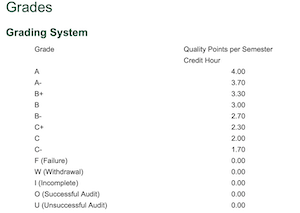MBA grades: Do they matter?
Yes and No.
Not really.
It depends.
All famous MBA t-shirt designs.
YES
The accurate answer is yes grades do matter for a simple reason. Most graduate programs have a policy called satisfactory academic progress or some variation thereof. Basically, it means grad students must maintain a B letter grade or at least a 3.0 GPA to stay in their MBA program. Some programs such as UVA’s Darden use Academic Standards Committee (ASC) points frameworks scaling from “Distinguished Performance” to “Fail”.
William and Mary’s Mason School of Business uses this grade framework:

In many programs getting below a 3.0 GPA has serious impacts including academic probation, loss of VA GI Bill funding, no scholarships, and potentially academic dismissal. Usually, <3.0 GPAs trigger automatic warnings and mandatory reviews with the program director. Students can appeal course grades and academic dismissal. The process is very specific and is date limited, i.e. you may have up to 10 days after the end of the semester to file an appeal.
In executive, evening, and part-time MBA programs, employers are generally offering tuition reimbursement. At CapitalOne the amount is $5,250 per year. Less than a 3.0 GPA or a “B” often makes you ineligible for tuition reimbursement.
After graduation, grades matter if you are planning on obtaining additional master’s or doctoral degrees. Some jobs will require you to share official transcripts, especially in government or financial services. If you plan on teaching at any level, you will need to provide transcripts. Note that LinkedIn does not verify your academic degrees.
NO
Ten years after graduation, grades mean little. The network from your cohort, leadership and communication skills are the most valuable takeaways from your MBA program.
TL;DR: Yes grades matter while in graduate school. Not so much after graduation.